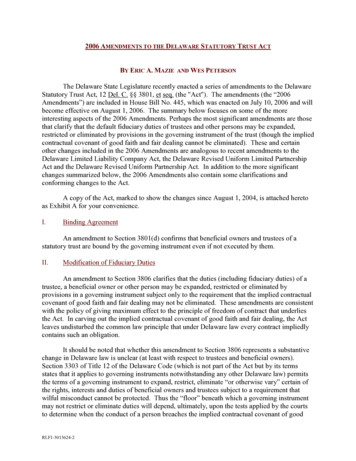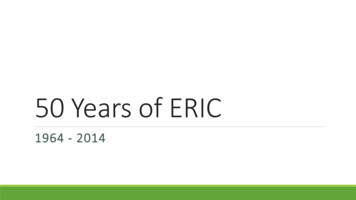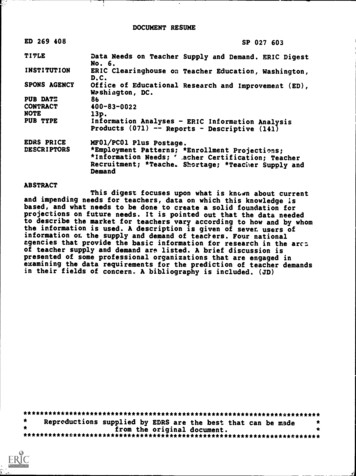
Transcription
2006 AMENDMENTS TO THE DELAWARE STATUTORY TRUST ACTBY ERIC A. MAZIEAND WES PETERSONThe Delaware State Legislature recently enacted a series of amendments to the DelawareStatutory Trust Act, 12 Del. C. §§ 3801, et seq. (the "Act"). The amendments (the “2006Amendments”) are included in House Bill No. 445, which was enacted on July 10, 2006 and willbecome effective on August 1, 2006. The summary below focuses on some of the moreinteresting aspects of the 2006 Amendments. Perhaps the most significant amendments are thosethat clarify that the default fiduciary duties of trustees and other persons may be expanded,restricted or eliminated by provisions in the governing instrument of the trust (though the impliedcontractual covenant of good faith and fair dealing cannot be eliminated). These and certainother changes included in the 2006 Amendments are analogous to recent amendments to theDelaware Limited Liability Company Act, the Delaware Revised Uniform Limited PartnershipAct and the Delaware Revised Uniform Partnership Act. In addition to the more significantchanges summarized below, the 2006 Amendments also contain some clarifications andconforming changes to the Act.A copy of the Act, marked to show the changes since August 1, 2004, is attached heretoas Exhibit A for your convenience.I.Binding AgreementAn amendment to Section 3801(d) confirms that beneficial owners and trustees of astatutory trust are bound by the governing instrument even if not executed by them.II.Modification of Fiduciary DutiesAn amendment to Section 3806 clarifies that the duties (including fiduciary duties) of atrustee, a beneficial owner or other person may be expanded, restricted or eliminated byprovisions in a governing instrument subject only to the requirement that the implied contractualcovenant of good faith and fair dealing may not be eliminated. These amendments are consistentwith the policy of giving maximum effect to the principle of freedom of contract that underliesthe Act. In carving out the implied contractual covenant of good faith and fair dealing, the Actleaves undisturbed the common law principle that under Delaware law every contract impliedlycontains such an obligation.It should be noted that whether this amendment to Section 3806 represents a substantivechange in Delaware law is unclear (at least with respect to trustees and beneficial owners).Section 3303 of Title 12 of the Delaware Code (which is not part of the Act but by its termsstates that it applies to governing instruments notwithstanding any other Delaware law) permitsthe terms of a governing instrument to expand, restrict, eliminate “or otherwise vary” certain ofthe rights, interests and duties of beneficial owners and trustees subject to a requirement thatwilful misconduct cannot be protected. Thus the “floor” beneath which a governing instrumentmay not restrict or eliminate duties will depend, ultimately, upon the tests applied by the courtsto determine when the conduct of a person breaches the implied contractual covenant of goodRLF1-3013624-2
faith and fair dealing or constitutes wilful misconduct. In other contexts, some Delaware caseshave interpreted the implied contractual covenant of good faith and fair dealing to includewrongful intent as an element that must be proved but what tests will be applied under Section3806 and Section 3303 - and whether they will differ - is currently unclear.III.Exculpation from Liability for Breach of DutiesNew Section 3806(d) provides a default provision that protects trustees, beneficialowners and other persons from liability for the good faith reliance on the provisions of agoverning instrument. This provision is applicable unless a governing instrument providesotherwise. In addition, new Section 3806(e) provides that a governing instrument may limit oreliminate liabilities for breach of contract and breach of duties (including fiduciary duties) oftrustees, beneficial owners and other persons though it may not shield them from liabilityassociated with a bad faith violation of the implied contractual covenant of good faith and fairdealing.IV.Meetings by Conference CallNew Sections 3806(f) and 3806(g) clarify that, unless a governing instrument providesotherwise, meetings of beneficial owners and trustees may be held by conference call or othermethod that allows all the participants to hear one another and that such participation willconstitute presence in person at a meeting.V.Reliance on Experts, Records and Other InformationNew Section 3806(k) provides that trustees, beneficial owners or other personsdesignated in accordance with Section 3806(b)(7) (i.e., persons considered agents or independentcontractors with authority to act on behalf of the trust) are fully protected from relying in goodfaith on records or other information relating to a statutory trust and certain other informationpresented to them by (i) another trustee, beneficial owner or other person designated inaccordance with Section 3806(b)(7) or (ii) any other person, subject to the requirement that suchrecords are reasonably believed to be within such other person’s professional or expertcompetence. The 2006 Amendments make clear that these records and information can relate to,among other things, the value and amount of assets, liabilities, profits or losses of the statutorytrust or the sufficiency of assets, reserves or undertakings necessary to make distributions tobeneficial owners or to pay, or make provision for the payment to, creditors.VI.Revocation of DissolutionAn amendment to Section 3808(c) provides that in certain circumstances,notwithstanding that the governing instrument may specify an earlier dissolution, the dissolutionof a statutory trust may be revoked prior to the filing of a certificate of cancellation upon theaffirmative vote of all remaining beneficial owners of a statutory trust (and any other personrequired under the governing instrument for the revocation of dissolution of a statutory trust).2RLF1-3013624-2
VII.Transfer, Domestication or Continuance of a Statutory TrustAn amendment to Section 3823(b) adds flexibility in drafting a governing instrumentwith respect to the transfer, domestication or continuance of a statutory trust. While stillpreserving the ability to prohibit or set forth the voting requirements with respect to thesematters, this amendment provides that if they are not specifically addressed or prohibited in thegoverning instrument the method for their approval that would govern would be the samemethod set forth in the governing instrument for the approval of a merger or consolidation thatinvolves the statutory trust as a constituent party. Otherwise the Act provides a defaultrequirement that all trustees and beneficial owners must approve.VIII.Activities Not Constituting Doing Business in DelawareNew Section 3863 lists a number of activities by foreign statutory trusts that if conductedin the State of Delaware will not be deemed to be doing business in the State of Delaware. TheSection also makes clear that a person will not be deemed to be doing business in the State ofDelaware solely by reason of being a beneficial owner or trustee of a domestic or foreignstatutory trust. The Section makes clear, however, that it does not apply in determining whethera foreign statutory trust is subject to service of process, taxation or regulation under any otherDelaware law.3RLF1-3013624-2
EXHIBIT ARLF1-3013624-2
Richards, Layton & Finger, P.A.P.O. Box 551Wilmington, Delaware 19899www.rlf.comCHAPTER 38. TREATMENT OF DELAWARESTATUTORY TRUSTSDelaware Statutory Trust Act, as amended and in effect on August 1, 2004 2006§ 3801. Definitions.(a)"Statutory trust" means an unincorporated association which (i) is createdby a governing instrument under which property is or will be held, managed, administered,controlled, invested, reinvested and/or operated, or business or professional activities for profitare carried on or will be carried on, by a trustee or trustees or as otherwise provided in thegoverning instrument for the benefit of such person or persons as are or may become beneficialowners or as otherwise provided in the governing instrument, including but not limited to a trustof the type known at common law as a "business trust," or "Massachusetts trust," or a trustqualifying as a real estate investment trust under § 856 et seq., of the United States InternalRevenue Code of 1986 [26 U.S.C. § 856 et seq.], as amended, or under any successor provision,or a trust qualifying as a real estate mortgage investment conduit under § 860D of the UnitedStates Internal Revenue Code of 1986 [26 U.S.C. § 860D], as amended, or under any successorprovision, and (ii) files a certificate of trust pursuant to § 3810 of this title. Any such associationheretofore or hereafter organized shall be a statutory trust and a separate legal entity. Astatutory trust may be organized to carry on any lawful business or activity, whether or notconducted for profit, and/or for any of the purposes referred to in clause (i) of thissubsection (including, without limitation, for the purpose of holding or otherwise takingtitle to property, whether in an active or custodial capacity). The term "statutory trust" shallbe deemed to include each trust formed under Chapter 38, Title 12 of the Delaware Code prior toSeptember 1, 2002 as a "business trust" (as such term was then defined in section 3801(a) ofChapter 38, Title 12 of the Delaware Code). Neither use of the designation "business trust" nor astatement in a certificate of trust or governing instrument executed prior to September 1, 2002, tothe effect that the trust formed thereby is or will qualify as a Delaware business trust within themeaning of or pursuant to Chapter 38, Title 12 of the Delaware Code, shall create a presumptionor an inference that the trust so formed is a "business trust" for purposes of Title 11 of the UnitedStates Code.(b)"Beneficial owner" means any owner of a beneficial interest in a statutorytrust, the fact of ownership to be determined and evidenced (whether by means of registration,the issuance of certificates or otherwise) in conformity to the applicable provisions of thegoverning instrument of the statutory trust.
(c)"Trustee" means the person or persons appointed as a trustee inaccordance with the governing instrument of a statutory trust, and may include the beneficialowners or any of them.(d)"Person" means a natural person, partnership, limited partnership(whether general or limited), limited liability company, trust, estate, association (includingany group, organization, co-tenancy, plan, board, council or committee), corporation,government (including a country, state, county or any other governmental subdivision,agency or instrumentality), custodian, nominee or any other individual or entity (or seriesthereof) in its own or any representative capacity, in each case, whether domestic or foreign, anda statutory trust or foreign statutory trust.(e)"Other business entity" means a corporation, a partnership (whethergeneral or limited), a limited liability company, a common-law trust, a foreign statutory trust orany other unincorporated business, excluding a statutory trust.(f)"Governing instrument" means any instrument (whether referred to as atrust agreement, declaration of trust or otherwise) which creates a statutory trust or provides forthe governance of the affairs of the statutory trust and the conduct of its business. A governinginstrument:(1)may provide that a person shall become a beneficial owner or atrustee and shall become bound by the governing instrument if such person (or, inthe case of a beneficial owner, a representative authorized by such person orally,in writing or by other action such as payment for a beneficial interest) complieswith the conditions for becoming a beneficial owner or a trustee set forth in thegoverning instrument or any other writing and, in the case of a beneficial owner,acquires a beneficial interest;(2)may consist of one or more agreements, instruments or otherwritings and may include or incorporate by-laws containing provisions relating tothe business of the statutory trust, the conduct of its affairs and its rights orpowers or the rights or powers of its trustees, beneficial owners, agents oremployees; and(3)may contain any provision that is not inconsistent with law or withthe information contained in the certificate of trust.A statutory trust is not required to execute its governing instrument. A statutory trust is boundby its governing instrument whether or not the statutory trust executes the governing instrument.A beneficial owner or a trustee is bound by the governing instrument whether or not suchbeneficial owner or trustee executes the governing instrument.(g)"Foreign statutory trust" means a business trust or statutory trust formedunder the laws of any state or under the laws of any foreign country or other foreign jurisdiction2
and denominated as such under the laws of such state or foreign country or other foreignjurisdiction.(h)"Independent Trustee" means, solely with respect to a statutory trust thatis registered as an investment company under the Investment Company Act of 1940, as amended(15 U.S.C. §80a-1 et seq.), or any successor statute thereto (the "1940 Act"), any trustee who isnot an "interested person" (as such term is defined below) of the statutory trust; provided that thereceipt of compensation for service as an independent trustee of the statutory trust and also forservice as an independent trustee of one or more other investment companies managed by asingle investment adviser (or an "affiliated person" (as such term is defined below) of suchinvestment adviser) shall not affect the status of a trustee as an independent trustee under thisChapter. An independent trustee as defined hereunder shall be deemed to be independent anddisinterested for all purposes. For purposes of this definition, the terms "affiliated person" and"interested person" have the meanings set forth in the 1940 Act or any rule adopted thereunder.§ 3802. Contributions by beneficial owners.(a)A contribution of a beneficial owner to the statutory trust may be in cash,property or services rendered, or a promissory note or other obligation to contribute cash orproperty or to perform services; provided, however, that a person may become a beneficialowner of a statutory trust and may receive a beneficial interest in a statutory trust without makinga contribution or being obligated to make a contribution to the statutory trust.(b)Except as provided in the governing instrument, a beneficial owner isobligated to the statutory trust to perform any promise to contribute cash, property or to performservices, even if the beneficial owner is unable to perform because of death, disability or anyother reason. If a beneficial owner does not make the required contribution of property orservices the beneficial owner is obligated at the option of the statutory trust to contribute cashequal to that portion of the agreed value (as stated in the records of the statutory trust) of thecontribution that has not been made. The foregoing option shall be in addition to, and not in lieuof, any other rights, including the right to specific performance, that the statutory trust may haveagainst such beneficial owner under the governing instrument of applicable law.(c)A governing instrument may provide that the interest of any beneficialowner who fails to make any contribution that he is obligated to make shall be subject to specificpenalties for, or specified consequences of, such failure. Such penalty or consequence may takethe form of reducing or eliminating the defaulting beneficial owner's proportionate interest in thestatutory trust, subordinating his beneficial interest to that of nondefaulting beneficial owners, aforced sale of his beneficial interest, forfeiture of his beneficial interest, the lending by otherbeneficial owners of the amount necessary to meet his commitment, a fixing of the value of hisbeneficial interest by appraisal or by formula and redemption or sale of his beneficial interest atsuch value, or any other penalty or consequence.§ 3803. Liability of beneficial owners and trustees.3
(a)Except to the extent otherwise provided in the governing instrument of thestatutory trust, the beneficial owners shall be entitled to the same limitation of personal liabilityextended to stockholders of private corporations for profit organized under the GeneralCorporation Law of the State of Delaware.(b)Except to the extent otherwise provided in the governing instrument of astatutory trust, a trustee, when acting in such capacity, shall not be personally liable to anyperson other than the statutory trust or a beneficial owner for any act, omission or obligation ofthe statutory trust or any trustee thereof.(c)Except to the extent otherwise provided in the governing instrument of astatutory trust, an officer, employee, manager or other person acting pursuant to § 3806(b)(7),when acting in such capacity, shall not be personally liable to any person other than the statutorytrust or a beneficial owner for any act, omission or obligation of the statutory trust or any trusteethereof.(d)No obligation of a beneficial owner or trustee of a statutory trust to thestatutory trust arising under the governing instrument or a separate agreement in writing, and nonote, instrument or other writhing evidencing any such obligation of a beneficial owner ortrustee, shall be subject to the defense of usury, and no beneficial owner or trustee shall interposethe defense of usury with respect to any such obligation in any action.§ 3804. Legal proceedings.(a)A statutory trust may sue and be sued, and service of process upon 1 of thetrustees shall be sufficient. In furtherance of the foregoing, a statutory trust may be sued fordebts and other obligations or liabilities contracted or incurred by the trustees, or by the dulyauthorized agents of such trustees, in the performance of their respective duties under thegoverning instrument of the statutory trust, and for any damages to persons or property resultingfrom the negligence of such trustees or agents acting in the performance of such respectiveduties. The property of a statutory trust shall be subject to attachment and execution as if it werea corporation, subject to § 3502 of Title 10. Notwithstanding the foregoing provisions of this §3804, in the event that the governing instrument of a statutory trust, including a statutory trustwhich is a registered investment company under the Investment Company Act of 1940, asamended (15 U.S.C. §§ 80a-1 et seq.), creates one or more series as provided in § 3806(b)(2),and if separate and distinct records are maintained for any such series and the assets associatedwith any such series are held in such separate and distinct records (directly or indirectly,including through a nominee or otherwise) and accounted for in such separate and distinctrecords separately from the other assets of the statutory trust, or any other series thereof, and ifthe governing instrument so provides, and notice of the limitation on liabilities of a series asreferenced in this sentence is set forth in the certificate of trust of the statutory trust, then thedebts, liabilities, obligations and expenses incurred, contracted for or otherwise existing withrespect to a particular series shall be enforceable against the assets of such series only, and notagainst the assets of the statutory trust generally or any other series thereof, and, unless otherwiseprovided in the governing instrument, none of the debts, liabilities, obligations and expenses4
incurred, contracted for or otherwise existing with respect to the statutory trust generally or anyother series thereof shall be enforceable against the assets of such series.(b)A trustee of a statutory trust may be served with process in the mannerprescribed in subsection (c) of this section in all civil actions or proceedings brought in the Stateof Delaware involving or relating to the activities of the statutory trust or a violation by a trusteeof a duty to the statutory trust, or any beneficial owner, whether or not the trustee is a trustee atthe time suit is commenced. Every resident or nonresident of the State of Delaware who acceptselection or appointment or serves as a trustee of a statutory trust shall, by such acceptance orservice, be deemed thereby to have consented to the appointment of the Delaware trustee orregistered agent of such statutory trust required by § 3807 of this title (or, if there is none, theSecretary of State) as such person's agent upon whom service of process may be made asprovided in this section. Such acceptance or service shall signify the consent of such trustee thatany process when so served shall be of the same legal force and validity as if served upon suchtrustee within the State of Delaware and such appointment of such Delaware trustee or registeredagent (or, if there is none, the Secretary of State) shall be irrevocable.(c)Service of process shall be effected by serving the Delaware trustee orregistered agent of such statutory trust required by § 3807 of this title (or, if there is none, theSecretary of State) with 1 copy of such process in the manner provided by law for service ofwrits of summons. In the event service is made under this subsection upon the Secretary ofState, the plaintiff shall pay to the Secretary of State the sum of 50 for the use of the State ofDelaware, which sum shall be taxed as part of the costs of the proceeding if the plaintiff shallprevail therein. In addition, the Prothonotary or the Register in Chancery of the court in whichthe civil action or proceeding is pending shall, within 7 days of such service, deposit in theUnited States mails, by registered mail, postage prepaid, true and attested copies of the process,together with a statement that service is being made pursuant to this section, addressed to thedefendant at his address last known to and furnished by the party desiring to make such service.(d)In any action in which any such trustee has been served with process ashereinafter provided, the time in which a defendant shall be required to appear and file aresponsive pleading shall be computed from the date of mailing by the Prothonotary or theRegister in Chancery as provided in subsection (c) of this section; provided, however, the courtin which such action has been commenced may order such continuance or continuances as maybe necessary to afford such trustee reasonable opportunity to defend the action.(e)In the governing instrument of the statutory trust or other writing, a trusteeor beneficial owner or other person may consent to be subject to the non-exclusive jurisdiction ofthe courts of, or arbitration in, a specified jurisdiction, or the exclusive jurisdiction of the courtsof the State, or the exclusivity of arbitration in a specified jurisdiction or the State, and to beserved with legal process in the manner prescribed in such governing instrument of the statutorytrust or other writing. Except by agreeing to arbitrate any arbitrable matter in a specifiedjurisdiction or in the State, a beneficial owner who is not a trustee may not waive its right tomaintain a legal action or proceeding in the courts of the State with respect to matters relating tothe organization or internal affairs of a statutory trust.5
(f)Nothing herein contained limits or affects the right to serve process in anyother manner now or hereafter provided by law. This section is an extension of and not alimitation upon the right otherwise existing of service of legal process upon nonresidents.(g)The Court of Chancery and the Superior Court may make all necessaryrules respecting the form of process, the manner of issuance and return thereof and such otherrules which may be necessary to implement this section and are not inconsistent with thissection. The Court of Chancery shall have jurisdiction over statutory trusts to the same extent asit has jurisdiction over common law trusts formed under the laws of the State of Delaware.(h)A partnership (whether general or limited), corporation or other nonnatural person formed or organized under the laws of any foreign country or other foreignjurisdiction or the laws of any state other than the State of Delaware shall not be deemed to bedoing business in the State of Delaware solely [by] reason of its being a trustee of a statutorytrust.§ 3805. Rights of beneficial owners and trustees in trust property.(a)Except to the extent otherwise provided in the governing instrument of thestatutory trust, a beneficial owner shall have an undivided beneficial interest in the property ofthe statutory trust and shall share in the profits and losses of the statutory trust in the proportion(expressed as a percentage) of the entire undivided beneficial interest in the statutory trust ownedby such beneficial owner. The governing instrument of a statutory trust may provide that thestatutory trust or the trustees, acting for and on behalf of the statutory trust, shall be deemed tohold beneficial ownership of any income earned on securities of the statutory trust issued by anybusiness entities formed, organized, or existing under the laws of any jurisdiction, including thelaws of any foreign country.(b)No creditor of the beneficial owner shall have any right to obtainpossession of, or otherwise exercise legal or equitable remedies with respect to, the property ofthe statutory trust.(c)A beneficial owner's beneficial interest in the statutory trust is personalproperty notwithstanding the nature of the property of the trust. Except to the extent otherwiseprovided in the governing instrument of a statutory trust, a beneficial owner has no interest inspecific statutory trust property.(d)A beneficial owner's beneficial interest in the statutory trust is freelytransferable except to the extent otherwise provided in the governing instrument of the statutorytrust,(e)Except to the extent otherwise provided in the governing instrument of astatutory trust, at the time a beneficial owner becomes entitled to receive a distribution, he hasthe status of, and is entitled to all remedies available to, a creditor of the statutory trust withrespect to the distribution. A governing instrument may provide for the establishment of recorddates with respect to allocations and distributions by a statutory trust.6
(f)Except to the extent otherwise provided in the governing instrument of thestatutory trust, legal title to the property of the statutory trust, or any part thereof, may be held inthe name of any trustee of the statutory trust, in its capacity as such, with the same effect as ifsuch property were held in the name of the statutory trust.(g)No creditor of the trustee shall have any right to obtain possession of, orotherwise exercise legal or equitable remedies with respect to, the property of the statutory trustwith respect to any claim against, or obligation of, such trustee in its individual capacity and notrelated to the statutory trust.(h)Except to the extent otherwise provided in the governing instrument of thestatutory trust, where the statutory trust is a registered investment company under the InvestmentCompany Act of 1940, as amended (15 U.S.C. §§ 809-1 et seq.), any class, group or series ofbeneficial interests established by the governing instrument with respect to such statutory trustshall be a class, group or series preferred as to distribution of assets or payment of dividends overall other classes, groups or series in respect to assets specifically allocated to the class, group orseries as contemplated by Section 18 (or any amendment or successor provision) of theInvestment Company Act of 1940, as amended, and any regulations issued thereunder, providedthat this section is not intended to affect in any respect the provisions of § 3804(a) of this title.(i)Unless otherwise provided in the governing instrument of a statutory trustor another agreement, a beneficial owner shall have no preemptive right to subscribe to anyadditional issue of beneficial interests or another interest in a statutory trust.§ 3806. Management of statutory trust.(a)Except to the extent otherwise provided in the governing instrument of astatutory trust, the business and affairs of a statutory trust shall be managed by or under thedirection of its trustees. To the extent provided in the governing instrument of a statutory trust,any person (including a beneficial owner) shall be entitled to direct the trustees or other personsin the management of the statutory trust. Except to the extent otherwise provided in thegoverning instrument of a statutory trust, neither the power to give direction to a trustee or otherpersons nor the exercise thereof by any person (including a beneficial owner) shall cause suchperson to be a trustee. To the extent provided in the governing instrument of a statutory trust,neither the power to give direction to a trustee or other persons nor the exercise thereof by anyperson (including a beneficial owner) shall cause such person to have duties (including fiduciaryduties) or liabilities relating thereto to the statutory trust or to a beneficial owner thereof.(b)A governing instrument may contain any provision relating to themanagement of the business and affairs of the statutory trust, and the rights, duties andobligations of the trustees, beneficial owners and other persons, which is not contrary to anyprovision or requirement of this chapter and, without limitation:(1)May provide for classes, groups or series of trustees or beneficialowners, or classes, groups or series of beneficial interests, having such relativerights, powers and duties as the governing instrument may provide, and may make7
provision for the future creation in the manner provided in the governinginstrument of additional classes,
CHAPTER 38. TREATMENT OF DELAWARE STATUTORY TRUSTS Delaware Statutory Trust Act, as amended and in effect on August 1, 2004 2006 § 3801. Definitions. (a) "Statutory trust" means an unincorporated association which (i) is created by a governing instrument under which property is or will be held, managed, administered,










